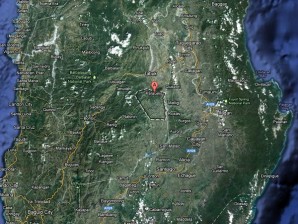Mother of 6 gives CCT a bright, lively human face

She does not have to do that anymore.
As one of the first batch of beneficiaries of the Pantawid Pamilyang Pilipino Program (4Ps), also known as the conditional cash transfer (CCT) program, in the Cordillera region in 2009, Baccay has been receiving cash grants to help send her children to school.
But, as the name implies, the dole comes with strings attached. Baccay’s children, who will be beneficiaries until they reach 14 years of age, must continue attending school regularly.
Paracelis, a second-class community and the 12th poorest municipality in the region, has a poverty incidence of 59.91 percent. Baccay’s family is in this bracket.
As a poverty-alleviation tool, the 4Ps, which is being administered by the Department of Social Welfare and Development (DSWD), has improved the health and well-being of children in poor communities through the cash transfer.
Article continues after this advertisementNot all about money
Article continues after this advertisementBut 4Ps is not all about money.
Two years into the program, Baccay has also become a beneficiary of the DSWD’s sustainable livelihood program where she was taught how to become a massage therapist.
“Compared with buy-and-sell where it’s by no means sure that anyone would want to buy the mung beans I’m selling, with massage therapy at least I can count on earning at least P200 a day,” she said.
Baccay is also enrolled in a monthly family development session, where parents can learn about family issues and management. She now does the rounds of the community encouraging neighbors to quit gambling and start activities related to sanitation as well as clean-and-green projects.
“I’ve learned a lot with the Pantawid Pamilya at Livelihood (formerly SEA-K) program. I have met people that I never thought I would ever get to talk to. I learned to be a responsible person, to become a leader in our community,” Baccay said.
CCT nothing new
The CCT is not an entirely new thing. It evolved from the widespread failure of unconditional welfare programs in the post-World War II developed countries. It is based on the notion that you can reduce poverty by giving money to poor people, no strings attached.
Globally, there have been CCTs since the late 1990s. But while the CCT failed in developed countries, it seems to report good results in Third World countries like Mexico, Brazil, Argentina, Bangladesh, Jamaica, Honduras, Turkey and the Philippines, with or without conditions attached.
DSWD doesn’t hold money
According to Social Welfare Secretary Dinky Soliman, contrary to the public perception, the DSWD does not hold the money for CCT. The money is deposited with the Land Bank of the Philippines, with some help from the Bankers’ Association of the Philippines, and can be withdrawn by the beneficiaries via ATM or over the counter without transaction fees.
Soliman explained that each household can get P500 for health and P300 educational assistance for up to three children below 14 years old, or a maximum of P1,400.
“What we need is to improve our capacity at our level and at the level of the disbursing institution to do the reconciliation in a faster manner because Land Bank will not disburse the money, if [is] not reconciled,” Soliman said in an interview.
‘Beneficiaries not lazy’
She lashed out at skeptics who say that the program is making the beneficiaries lazy and dependent on doles.
She stressed that the beneficiaries have not stopped working and that the cash transfer is just meant to augment their income.
“Thinking it makes people lazy is a misappreciation of what the P800 can do. They don’t stop working. This is just to augment whatever money they have,” Soliman told the Inquirer.
From the P21-billion CCT budget in 2011 to P39 billion in 2012, the DSWD is proposing to further increase the budget allocation to P44 billion in 2013, to increase the number of beneficiaries to 3 million.
Asked about the tendency of some beneficiaries to borrow against their benefits, Soliman said this has to be looked at from a different perspective.
“One way of looking at it is it’s wrong because that means they’re already compromising the amount they’re supposed to get,” she said.
“But another way of looking at that is it is an increased capacity to negotiate from someone who has had no negotiating power to get a resource that they need at that time,” Soliman said.
Very strong monitoring
Soliman said the DSWD maintains very strong third-party monitoring of the program’s implementation through the 320 civil society, nongovernmental organizations and faith-based groups.
A total of 59 percent of the 1,330 complaints filed against certain disqualified families on Feb. 25 this year have been acted on as of June, she claimed. The bulk of the complaints came from the National Capital Region and some parts of Mindanao.
Data-driven
Soliman said the DSWD has delisted 29,946 households for fraudulence by not being truthful about their children having stopped going to school, or whose children-beneficiaries do not fall within the age bracket required of the program, or those whose age were above 14.
A family whose child fails to meet the required 85-percent attendance rate each month loses the P500 cash assistance.
“So everything is data-driven. We’re now focusing on the impact of the program on these people and we’re working with the Departments of Education and Health in working our data together,” she said.